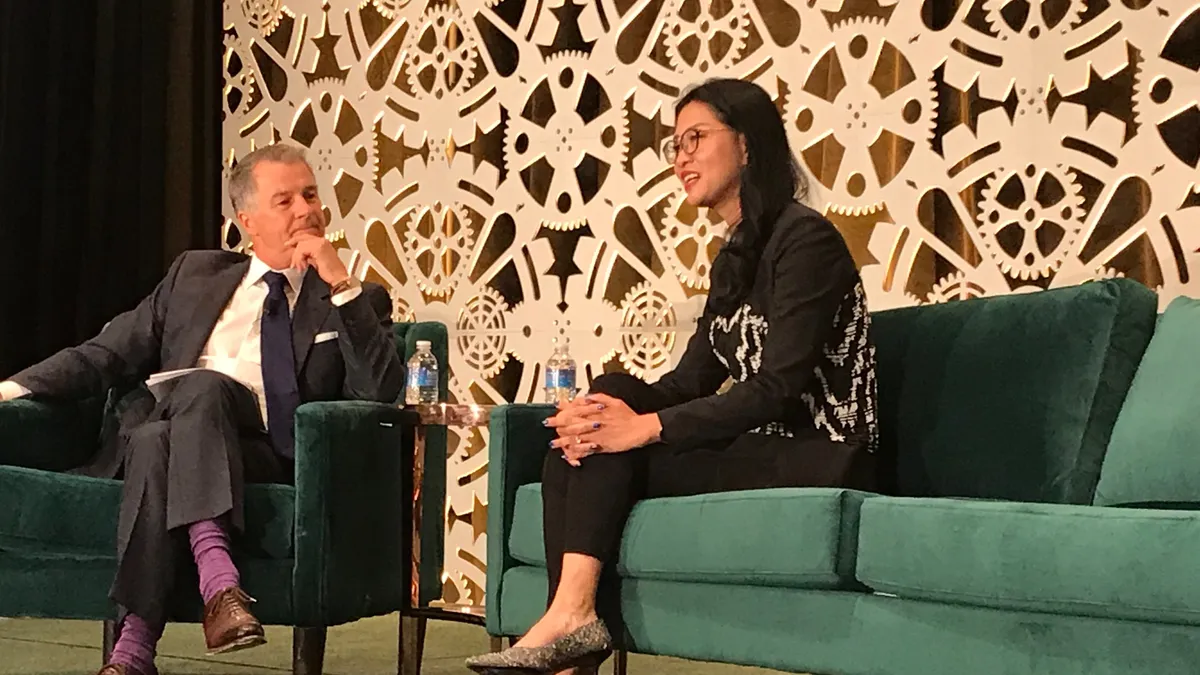The American Apparel and Footwear Association's 2019 Executive Summit in Oxon Hill, Maryland, brought together some of the biggest names in retail for two days last week. The theme of "Demand and Deliver" was explored by senior executives from all parts of the industry, including Alibaba, Burlington Stores, JD.com, Patagonia and New Balance Athletics. Patterns of concern bubbled to the surface on topics regarding the relationship between the United States and China, the market's interaction with technology and shifts in consumer trends.
Out of all the panels and keynote speeches at AAFA's conference this year, here are the top seven most memorable quotes.
-
Xia Ding, President of JD International Fashion and Vice President of JD.com
"Tencent has social data. So when you are out trying to engage the consumer, understand [the consumer] you not only want to know what they buy, you also want to know what they read about, they chat about, what they do every day. So, that gives you [a] 360-degree profile of a consumer … [S]o that allows us to work with brands to increase the ROI by doing the more precise targeting of consumers."

President of JD International Fashion and Vice President of JD.com, Xia Ding, spoke about the Chinese e-commerce company's relationship with one of the world's largest technology, entertainment and social media companies, Tencent. According to Ding, the partnership allows the companies to further comprehend and analyze their customers.
-
Diane Hoskins, co-CEO of Gensler
"We're moving into transformation. Not just disruption anymore, but there's starting to be a path forward."

The word "disruptor" is often used to describe brands that change the consumer shopping experience. That's coming from digitally native brands like Warby Parker and Casper, players changing the way consumers shop for glasses or mattresses, or through experiential spaces like Adidas' Fifth Avenue location, which features a track for customers to test out the products on. Diane Hoskins, co-CEO of architecture and design firm Gensler, discussed the need for retailers to find the parts of retail that need to be "fast" — things like transactions — and those that need to be "slow" — the unique experiences consumers are looking to have.
-
Michael Evans, President, Alibaba Group
"There is no point for us to globalize and build our business in other parts of the world if we're not prepared as a platform to protect your IPR."

Alibaba has been plagued by the stigma of counterfeiters, with co-founder and executive chairman of Alibaba Group, Jack Ma, once calling the rampant counterfeit market a "cancer." The company has taken steps to push out the offenders on its platform, working alongside Amazon and eBay to remove "dangerous products," including fakes, through a Product Safety Pledge with the European Commission. Alibaba is also collaborating with retailers to identify intellectual property rights violations, with the understanding that brand authenticity is important to maintain and grow its influence.
-
Rick Helfenbein, President and CEO of AAFA
"I have a son who is a millennial. Many of you in the room have children who are millennials. There's a few millennials, I know, in this room. You guys are wreaking havoc on retail. We don't know how to deal with you."

It's no secret that retail is in the midst of a major shift, with 2019 already succumbing to nearly 5,000 store closures since the first of the year. AAFA President and CEO Rick Helfenbein addressed the changing industry by homing in on generational consumption differences. Helfenbein went on to explain that retailers do understand that the millennial shopper is part of "a new reality," but that they are still learning.
-
Felix del Toro, SVP chief merchandise and design officer at Fabletics, TechStyle Fashion Group
"Social media is the new currency, it's connective tissue."

TechStyle Fashion Group, the parent company of ShoeDazzle, JustFab, FabKids, Fabletics and Savage X Fenty, recently revealed that the company has five million active members and exceeded $750 million in annual revenue last year. Additionally, the Fabletics brand has plans to open 75 new brick-and-mortar stores to go beyond its direct-to-consumer identity. But, its online roots have played a prominent role in understanding the brands' audiences, with customer input and feedback playing into a continual cycle of product development. Guest engagement through in-store experiences and social media, plus a steady influx of data, directly informs store merchandising, personalization efforts and website marketing.
-
John Murphy, Senior vice president for International Policy, U.S. Chamber of Commerce
"If you are having a trade war with Canada, you are doing it wrong."

President Donald Trump has delayed a planned 25% increase in tariffs, at least temporarily. Talks between China and the U.S. are ongoing, with the president stating that there is a planned summit between himself and President Xi at Mar-a-Largo, although details on when have been hazy. Senior Vice President for International Policy at the U.S. Chamber of Commerce, John Murphy, underlined the strained relationship between the U.S. and global allies due to the trade war. He explained that China is just one piece of a larger picture, and that what is happening right now is the result of what started last year with hikes on steel and aluminum imports. Murphy also said that if there is a piece of advice the private sector would pass on to the current administration, it would be to not engage on a multi-front trade war. Instead, he advises that the U.S. pick its battles.
-
Steve Lamar, EVP, AAFA
"We've weaponized tariffs and we're in danger of normalizing tariffs … Now that the genie's been let out of the bottle, will we begin to see tariffs used as a snapback device?"

A lot of angst has been generated around tariffs — whether they're from the U.S. or implemented by other nations in retaliation. The resulting costs of the trade war have been pointed out to Steve Lamar by both Congress and members of the AAFA. The potential for the Trump administration to continue tariffs in the future may grow, he said, which ultimately creates uncertainty going forward.
















